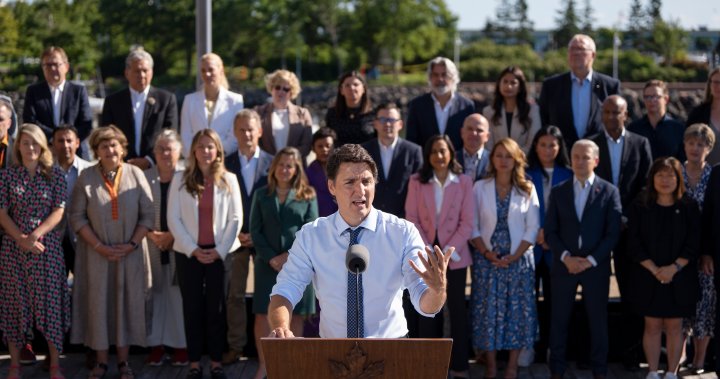It would be wrong to single out international students as a cause for Canada’s housing crisis, which is caused by multiple factors, Prime Minister Justin Trudeau said on Wednesday.
Speaking to reporters after this year’s cabinet retreat in Charlottetown, Trudeau said international students were just the latest group being blamed for the housing shortage.
“We have to be very careful. Over the past years, we’ve seen a lot of different people and a lot of different groups blamed for the housing crisis. At one point it was foreign homebuyers. At another point it was developers being super aggressive. Another point, it was under-investments by various orders of government. Now it’s people saying, ‘Oh, it’s international students,’” Trudeau said.
“Yes, there’s a lot of different factors that go into this housing crisis. But it’s something that has been brewing and developing over the past number of decades.”

A number of Trudeau’s cabinet colleagues have echoed this sentiment recently, but have also spurred questions about whether the government’s immigration targets need to be reviewed as the country struggles to cope with a housing crisis.
Public Safety Minister Dominic LeBlanc said Tuesday that changing the new immigration target isn’t a conversation he’s had with any fellow ministers, but he said the government must tailor its policies on immigration and housing to acknowledge the link between the two.
Immigration, LeBlanc said, is “essential for the economic prosperity and growth of the country” and every premier is talking about needing more immigrants to fill jobs. That includes those needed to build houses, as the construction industry is facing a critical labour shortage.
“But we’re not insensitive to the housing challenges that existed before provinces asked us to bring in more immigrants to help with the labour force,” he said.
“So you have to be coherent a little bit here, but we totally accept that the conversation needs to proceed at the same time so that we don’t inadvertently end up in a position that makes the housing affordability issue worse.”

Canada currently has 800,000 active study permit holders, and has established the goal of bringing in 500,000 new immigrants each year.
Housing Minister Sean Fraser suggested earlier this week that Ottawa consider a cap on the number of international students admitted to Canada each year.
Fraser, who until recently held the immigration portfolio, said colleges and universities haven’t all kept pace with the housing needs associated with increasing international students. He said both he and Immigration Minister Marc Miller needed to look at whether a cap on international students may be necessary.
A spokesperson for Miller’s office told Global News that while the minister was considering all options, a cap on international students can’t be the only solution and won’t fix the problem.
“Abuses in the system exist and must be tackled in smart and logical ways. This potentially includes implementing a cap but that can’t be the only measure, as it doesn’t address the entire problem,” said Bahoz Dara Aziz, Miller’s press secretary.
“We’re currently looking at a number of options in order to take a multifaceted approach to this.”
Immigration, Refugees and Citizenship Canada (IRCC), however, has said it “does not establish levels/caps for study permits in the way we do for permanent residence programs through the multi-year levels plan.”
The statement from the department said the federal government was “undertaking a review” of the international students program after Miller told The Canadian Press in an interview that he is open to reconsidering international student enrolments, particularly amid fraud concerns.
The spokesperson said they were already in consultation with universities, colleges and other stakeholders on how best to manage that flow.
Housing for incoming international students is also a major concern in the consultations.

Migrant Workers Alliance for Change, an advocacy group, said last week that linking immigration to housing was “racist thinking.”
“Many immigrants are also poor and like temporary migrants, they are not the ones increasing the demand for housing. They are the people facing a housing crisis,” a report by the group said.
“The population increase in the last two years was 3.9 per cent, but rental prices shot up an astronomical 20 per cent. The benchmark price to purchase a home has also increased more sharply than the population has, shooting up 6.3 per cent in just the last year.”
— with files from The Canadian Press
© 2023 Global News, a division of Corus Entertainment Inc.




